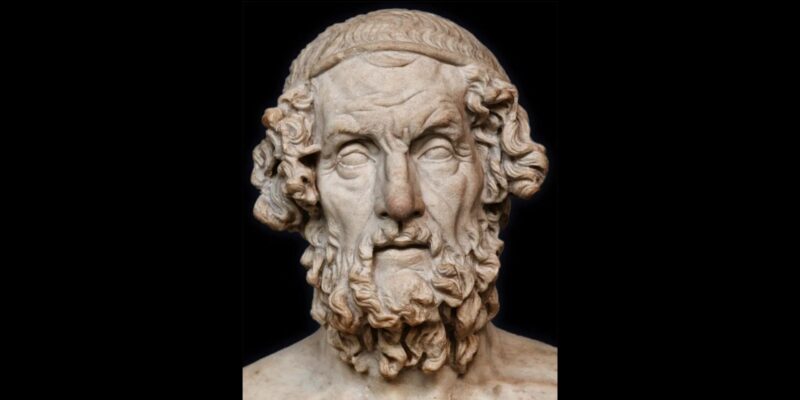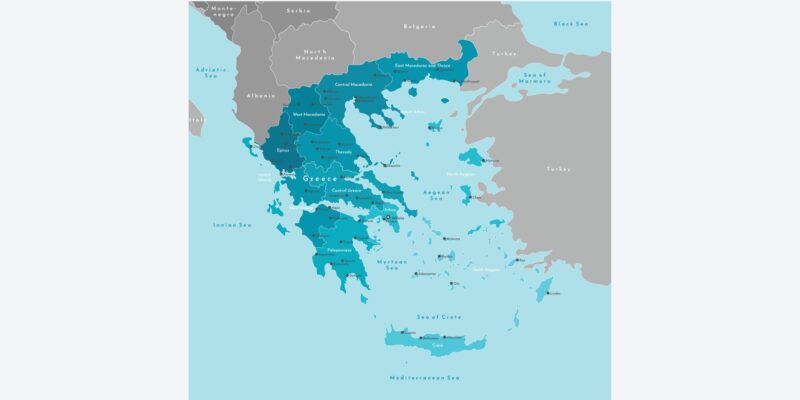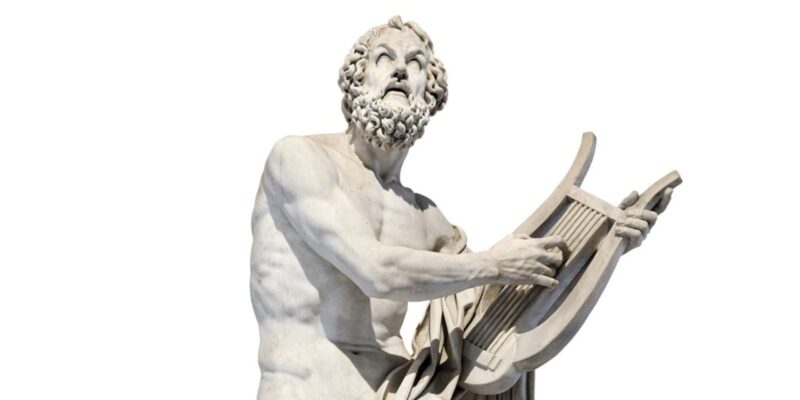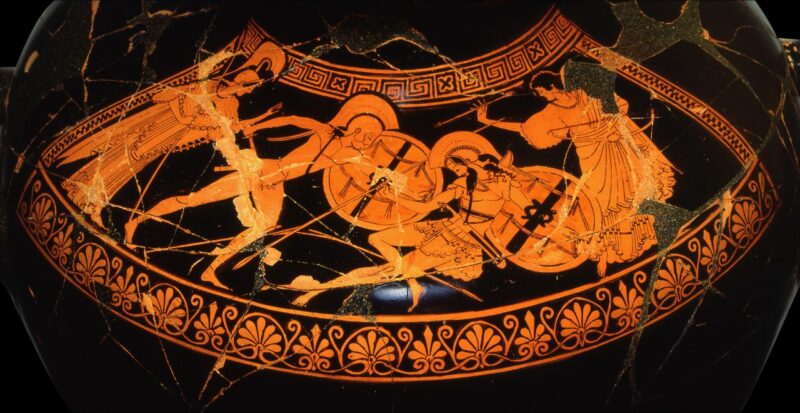We explore the life of Homer, the hypotheses about his identity, and his significance in the history of Western literature.

Homer was an aoidos, that is, a singer of epic poetry in Ancient Greece, who is credited as the author of the two foundational works in Greco-Roman tradition and, therefore, in all Western tradition: the Iliad and the Odyssey, both of which narrate the events of the mythical Trojan War.
Despite his unparalleled significance, little is known about this ancient literary figure, and much of what comes down to us is steeped in legend. He is thought to have been born and to have lived and died at some point during the 8th century BC, long before Ancient Greece experienced its golden age during the so-called Classical Period (from 500 BC to 323 BC). His exact place of birth remains unknown, and different stories surround his death.
The importance of Homer's work was well understood by his successors, who found inspiration in his writings for the great plays of classical Greek theater and a source of mythological tales for civic education. At that time, there were no doubts regarding the existence of the aoidos or the authorship of the two works ascribed to him, nor about the authenticity of the events narrated within, since they were deemed a collection of factual accounts.
Homer's epics are among the oldest and most popular surviving literary works. Initially composed to be sung, their significance goes beyond the realm of ancient Greek culture, becoming an integral part of the cultural heritage of the Roman Empire and, consequently, of the Christian world and Renaissance imagery.
Both works have been praised, translated, and studied throughout nearly three millennia, establishing Homer as one of the greatest authors of all time.
- See also: Edgar Allan Poe
Homer’s uncertain origins
There is not much reliable information regarding Homer's birth. Based on the earliest references to his work, which date back to at least the 7th century BC, he would have been born at some point during the 8th century BC or even the 9th century BC. Various Greek cities claim the honor of being his birthplace, as is the case with Smyrna, Chios, or Colophon. However, it is likely that Homer would have been a native of Ionia, in present-day Turkey, since his works were mostly composed in the Ionian dialect.
Adding to the lack of reliable sources of the time, a plethora of tales and legends surround Homer’s life, written throughout the centuries by ancient authors and scholars. According to some, he was a blind poet while in others, he was a slave.
Herodotus of Halicarnassus (484-425 BC), for instance, believed that Homer would have lived shortly after the Trojan War, around the 9th century BC. Meanwhile, Heraclitus of Ephesus (c. 540-480 BC) recounted that Homer had died from despair after failing to solve a riddle posed by a child.
Many of these legends and tales were incorporated into different pseudo-biographies of Homer written over the 3rd and 2nd centuries BC, which were in turn taken up and refined by scholars of the Roman Empire.

There are, however, other hypotheses regarding Homer, according to which he would not have been a real figure. Based on certain perceptible differences between the Iliad and the Odyssey regarding the use of language, philologists such as Friedrich August Wolf (1759-1824) raised the possibility that each text might have been written by a different author. If that were the case, it might actually have been the work of a collective rather than a single author.
In fact, lyric poet Pindar (c. 518-438 BC) spoke of the existence of the homeridai ("sons of Homer" in Greek), an ancient Ionian clan descendants of Homer responsible for popularizing his works throughout Greece.
However, the term homeros might be a distortion of the Ionic word homaros, which may be translated as "hostage". The homeridai might have been a group of war prisoners, too old or crippled (blind, for instance) to work, who would have served as performers of local epic poetry. Lucian of Samosata (125-181 AD) held that Homer was actually a Babylonian hostage taken by Greece, and that this is where his name originated.
The life of the aoidos
The term aoidos comes from the Greek aoidós, meaning "singer", which was used in Ancient Greece to refer to a profession similar to that of medieval bards. These were itinerant performers who recited the great mythological epics of local tradition, often accompanied by a typical string instrument called cithara (zither). Homer was the most prominent and best-known aoidos in antiquity.
It follows that both the Iliad and the Odyssey, particularly extensive works, were composed for oral recitation, that is, with no support from the written text. Hence the verse structure, as rhyme aids the poet's memory in recalling subsequent verses more easily. This also raises the question of when and how these epics were first transcribed or recorded in writing.

The aoidoi often sang for the aristocracy, at their courts and banquets, or at gatherings and events within the polis. Their songs could be short poems recounting a specific anecdote or episode, as is the case of the Homeric Hymns dedicated to a specific god or mythological figure, or they might be more extensive songs, too long to be recited on a single day, as was likely the case with the Iliad, which recounts the events of the final year of the Greek siege of Troy.
Most of what we know about the life of the aoidoi is, paradoxically, thanks to Homer. In his works (especially in the Odyssey) light is shed on the profession, through his characters Demodocus, aoidos at the court of the Phaeacian King Alcinous, and Phemius, aoidos at the court in Ithaca. When their recitation was finished, the aoidos would receive a gift from the audience. The more moved the listeners were by their song, the greater the reward.
Some of his ancient biographers assert that Homer built the character of Phemius after a real-life aoidos who taught him the profession and was also married to his mother. Allegedly, following the death of his stepfather, Homer dedicated himself to the profession at the head of a school for aoidoi, before he was blinded by some illness.
The terms aoidos and rhapsode should not be confused, though both derive from Ancient Greek and make reference to a type of popular performer. Aoidoi recited their own compositions, accompanying themselves with musical instruments, whereas rhapsodes memorized already existing compositions and would recite them with the help of a staff to mark the rhythm by tapping on the floor.
Death and burial of Homer
Just as the details of Homer's life remain unknown, so are the exact circumstances of his death. However, there is one point most scholars tend to agree on: Homer died and was buried on the Greek island of Ios, located in the Cyclades archipelago in the Aegean Sea. Nevertheless, as is to be expected, there are differing accounts regarding the circumstances surrounding his death.
Traditional history holds that, as a young man, Homer consulted the oracle and was foretold his death. It would be on an island as a result of a riddle he would fail to solve. Years later, while in Ios, Homer encountered a group of Akkadian children who had been fishing and asked them how they had fared. The children, seeking to mock the elderly man, responded with a riddle: "What we caught, we threw away; what we didn't catch, we kept", referring to the lice on their heads. There are three different accounts of what happened next:
- The most widespread account holds that Homer, unable to understand the riddle, sensed the fulfillment of the prophecy and his impending death, plunging into despair. Little by little he stopped eating, fell ill, and succumbed, eventually fulfilling the prophecy.
- Another account suggests that Homer arrived on Ios already gravely ill, on a ship that ran aground on the coast. There he encountered the fisher boys and was asked the riddle, which he immediately understood as a sign of his impending death.
- A third version recounts that Homer arrived on Ios, where he was asked the riddle from the fisher boys and, obsessed with the desire to solve it and thus escape his youth's prophecy, he walked absentmindedly, slipped, and hit his head on the rocks.
Over the centuries, numerous legends have appeared regarding the discovery of Homer's tomb. In antiquity, it was said to have been found near Plakoto, while in the 18th century, Dutch explorer Pasch van Krienen claimed to have found it in another area of the island and to have transported the slab with the epitaph to the Italian city of Livorno, where it mysteriously disappeared.
The Homeric question
Beyond the myths and legends, Homer's work remains an important object of study for scholars and historians. In fact, the term "Homeric question" is used to refer to the debate concerning the real or fictional existence of the poet and the authenticity of his authorship of the Iliad and the Odyssey.
It is one of the longest-running debates in history, whose beginnings can be traced in antiquity, and which remains unresolved to this day. Several scholars from the 18th and 19th centuries made this issue their main academic concern, including Francois Hédelin, Giambattista Vico, Friedrich August Wolf, Adolf Kirchhoff, Ulrich von Wilamowitz-Moellendorff, among many others.
It is generally agreed among contemporary scholars that the Iliad and the Odyssey were the fruit of a long tradition of oral narratives, popularly transmitted from generation to generation. This, however, does not contradict the fact that it was Homer who gave them their renowned form, structure, and composition, laying the foundation for the transcripts and translations that have emerged over the centuries.
While Homer's major contribution in shaping and structuring these diverse and traditional tales has been acknowledged since ancient times, the question remains as to how they were transcribed in the first place: who penned the "final" version and under what authoritative criteria.

Whatever the case, Homer's work played a fundamental role in the Greco-Roman tradition, regarded as the artistic, moral, and literary cradle of the West. His works continue to be published, read, and studied today, and have inspired the work of hundreds of artists from different cultures and genres.
Main works of Homer
The main works attributed to Homer are:
The Iliad
The Iliad takes its title from the name the Greeks gave to the city of Troy: Ilion. It is a lengthy epic poem containing 15,693 verses organized into 24 different books, narrating the events during the 51 days of the final year of the Trojan War. In particular, it focuses on Achilles, one of the greatest heroes of the ancient Greek tradition.
In this conflict, not only did the invading Greek army and the resisting Trojan troops clash, but the gods of Olympus themselves took sides. Thus, in the human combat, the gods saw the opportunity to settle their own quarrels, protect their favored heroes, and punish those who had disrespected them.
The Odyssey
The Odyssey recounts the misadventures of one of the main protagonists of the Trojan War: the king of Ithaca, Odysseus (named Ulysses by the Romans), on his long journey home. This epic poem, consisting of 24 books, was the precursor of all adventure novels written later in history.
The story begins after the war is over, with the Trojan forces defeated, when Odysseus and his crew embark on a perilous return journey by boat, facing numerous calamities. Throughout 10 years of adventure and wandering, Odysseus struggles to reunite with his queen, Penelope, who barely resists the courtship of her suitors. The latter believe the king to be dead and aspire to the throne.
Homeric Hymns
The Homeric Hymns take their name from the fact that in ancient times they were ascribed to Homer (or, according to other views, to the homeridai). They are a collection of 32 to 34 short epic poems, much dissimilar from one another, recounting the stories of the principal Olympian gods and other important figures in Greek mythology.
These hymns were intended to be recited by the aoidoi as a prelude (proemium) to a longer epic poem. Some consist of just a few verses, while others extend to five hundred, all composed in the same metric style as the other works by Homer. According to Hesiod, they are the oldest extant works in Greek literature.
References
- Manguel, A. (2017). El legado de Homero. Penguin Random House.
- Reyes, A. (1989). Grecia. Fondo de Cultura Económica.
- S. Kirk, G. (2023). “Homer (Greek poet)”. The Encyclopaedia Britannica. https://www.britannica.com/
- VV.AA. (1963). Introducción a Homero. Ed. Luis Gil. Ediciones Guadarrama.
Explore next:
Was this information useful to you?
Yes NoThank you for visiting us :)